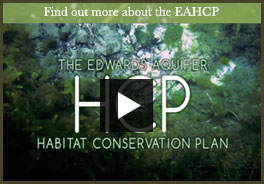Texas Wild Rice Enhancement and Restoration
Hardy (2011) describes the potential addition of Texas wild-rice habitat that might be achieved with the removal of non-native aquatic vegetation (Hydrilla vercticillata and Hygrophila polysperma). Hardy (2011) shows that the removal of H. vercticillata and H. polysperma within Texas wild-rice patches and including a 2-meter buffer around those patches could potentially provide over 1,000 m squared of additional optimum Texas wild-rice habitat area over the entire simulated flow range (45 to 80 cfs). Proactive planting and conservative non-native vegetation removal as a high potential for increasing existing Texas wild-rice occupied area that would remain hydraulically suitable at these models flow levels. Hardy(2011).
Based on BIO-WEST and TPWD monitoring data collected over the past decade and Hardy (2011) model results, the City of San Marcos, in partnership with Texas State University, will implement a Texas wild-rice enhancement and restoration program. Model results will be used to identify restoration/enhancement areas for Texas wild-rice that have a high probability of success (i.e., optimal habitat). In mixed (Texas wild-rice and non-native vegetation) stand areas, the non-natives will be removed and the original Texas wild-rice stand monitored for expansion. Similarly, for Texas wild-rice occupied optimal areas with adjacent non-native vegetation, the non-native plants will be removed and the Texas wild-rice stand monitored for expansion. Finally, in optimal areas for Texas wild-rice that are unoccupied by Texas wild-rice, non-native vegetation will be removed and Texas wild-rice plants planted and monitored to assess the potential success of transplants. As described in Hardy (2011), the specific areas chosen for field trials will first consider only optimal habitat areas that remain suitable over the full range of discharges between the long-term average and lower flows. Initial field experiments associated with Texas wild-rice enhancement will be initiated early in the first phase of the AMP.
